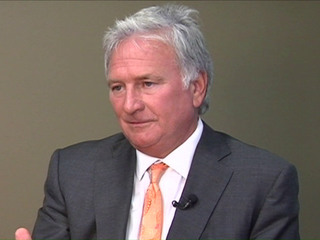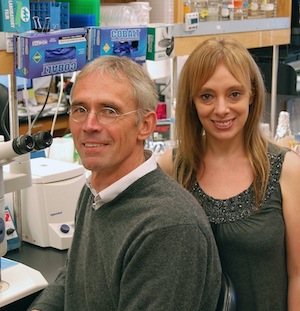Daily Business Report-Aug. 6, 2013
Scripps Research Institute’s Ulrich Mueller and Cristina Gil-Sanz were key authors of the new research report.
Scientists Find Key Signal that Guides Brain Development
Scientists at The Scripps Research Institute have decoded an important molecular signal that guides the development of a key region of the brain known as the neocortex. The largest and most recently evolved region of the brain, the neocortex is particularly well developed in humans and is responsible for sensory processing, long-term memory, reasoning, complex muscle actions, consciousness and other functions.
“The mammalian neocortex has a distinctive structure featuring six layers of neurons, and our finding helps explain how this layered structure is generated in early life,” said Ulrich Mueller, chair of the institute’s Department of Molecular and Cellular Neuroscience and director of the Dorris Neuroscience Center.
The discovery, which appears in the Aug. 7, 2013 issue of Neuron, also is likely to aid research on autism, schizophrenia and other psychiatric conditions. “With studies such as this one, we’re starting to understand the normal functions of molecules whose disruption by gene mutations can cause developmental brain disorders,” Mueller said.
Filner Begin Rehab as Calls for Resignation Grow
A chorus of calls for Bob Filner to resign grew Monday as San Diego’s mayor was to begin two weeks of behavioral therapy at an undisclosed location in response to accusations that he has sexually harassed women for years. Former Sen. Christine Kehoe, D-San Diego, who declined to run for the mayor’s office last year after Filner got into the race, told U-T San Diego that it was time for him to step down. Kehoe, who also served on the City Council and in the state Assembly, did not elaborate. Separately, Assembly Speaker John Perez, D-Los Angeles, told reporters before the first day of a new Assembly session that Filner was “incapacitated” and should resign, according to the newspaper. So far, at least 10 women have accused the 70-year-old mayor of unwanted advances, while another, Escondido Deputy Mayor Olga Diaz described a “weird” encounter with the former 10-term congressman. One woman, former mayoral Communications Director Irene McCormack Jackson, is suing Filner and the city. (City News Service report)
Aug. 15 Fundraiser to Benefit Casa Cornelia Law Center
Casa Cornelia Law Center, a San Diego nonprofit organization that provides pro bono legal services to victims of human and civil rights violations, and Hughes Marino will hold “An Evening of Art and Inspiration” on Thursday, Aug. 15, from 5:30 to 8 p.m. at the Hughes Marino offices at 1450 Front St. in Downtown San Diego. The event, in celebration of American Artist Appreciation Month, will feature the works of first-generation immigrant artists whose work has touched the lives of millions around the world. Guests will enjoy a private screening of the 2013 Oscar winning documentary “Inocente” and a live musical performance by Jorge Narvaez and his daughters, Alexa and Eliana. Proceeds will benefitt Casa Cornelia. work on behalf of San Diego’s most vulnerable children. Tickets are $50. Contact Allison Bechill at (619) 231-7787, Ext. 304 or visit www.casacornelia.org.
Downtown Rotary Club Donates to Connections Housing Project
The San Diego Downtown Breakfast Rotary Club donated $7,000 to support PATH’s street outreach efforts for the Connections Housing project. In return, The Rotary Club has been given room naming rights for the Street Outreach office located in the PATH Depot multi-service center, and a plaque has been installed in their honor.

Duane Roth: A Visionary for the Innovation Industry
As CEO of Connect, Duane Roth served as a spokesman and visionary for San Diego’s innovation industry. Roth died Saturday at the age of 63 from injuries sustained in a bicycling accident. He is survived by his wife, Renee Roth.
*****
A memorial service for Mr. Roth will be held at 11 a.m. Friday at Immaculata Church at the University of San Diego.
*****
Roth brought years of experience in pharmaceuticals to his position. Before joining Connect in 2004, Roth founded Alliance Pharmaceutical Corp. and held senior positions at Johnson & Johnson and Wyeth. Joining Connect at a period of stasis, Roth refocused the flagging organization on fostering early-stage commercialization of all the basic research being done in San Diego County.
While heading up Connect, he sat on the governing board for the California Institute for Regenerative Medicine, the state’s stem cell agency. He also served as vice chairman for Sanford-Burnham’s Board of Trustees. He was scheduled to become board chairman next month.
Connect’s relevance to San Diego’s modern start-up scene was the subject of some controversy earlier this year when outspoken local entrepreneur Brant Cooper called out Connect and other San Diego institutions as being “anachronistic, decidedly old-school and arguably more harmful to San Diego than beneficial.” But the comment thread to “Brant’s Rant” told a different story, with many successful entrepreneurs testifying to Connect’s value for companies outside the biotech sphere. Adam Riggs-Zeigen, co-founder of the exercise music service Rock My Run, wrote, “We have seen tremendous value from our CONNECT experience.”
News of Roth’s death sparked an outpouring of tributes:
Paul Laikind, Connect chairman:
He had a very important impact on that organization. We saw tremendous growth. To his credit, he also built a very strong team at Connect.
Jonathan Thomas, chairman, CIRM:
He was unfailingly a voice of reason and optimism and always sought to find ways to make things happen, refusing to take “no” for an answer.
Kristina Vuori, president, Sanford-Burnham:
Duane was an amazing friend, a leader, and mentor to all of us, and a true giant in the San Diego community and beyond. We greatly appreciated the vision and experience he contributed to our Institute.
Larry Smarr,founding director, Calit2:
San Diego has lost one of its great leaders. Duane Roth was a untiring champion of innovation, from academia to startups. I miss him deeply.
Bruce Bigelow, San Diego editor, Xconomy:
I liked Roth because he respected my role as a journalist … He knew I could be critical as well, and he never expected my support.
Jeanne Loring, principal investigator, The Scripps Research Institute:
He would say that each of us is just a diagnosis away from a devastating disease, that tomorrow our lives, or the lives of our loved ones could drastically change. His argument for stem cell research was that we must use whatever tools we have to cure disease.
(Reported by KPBS)



